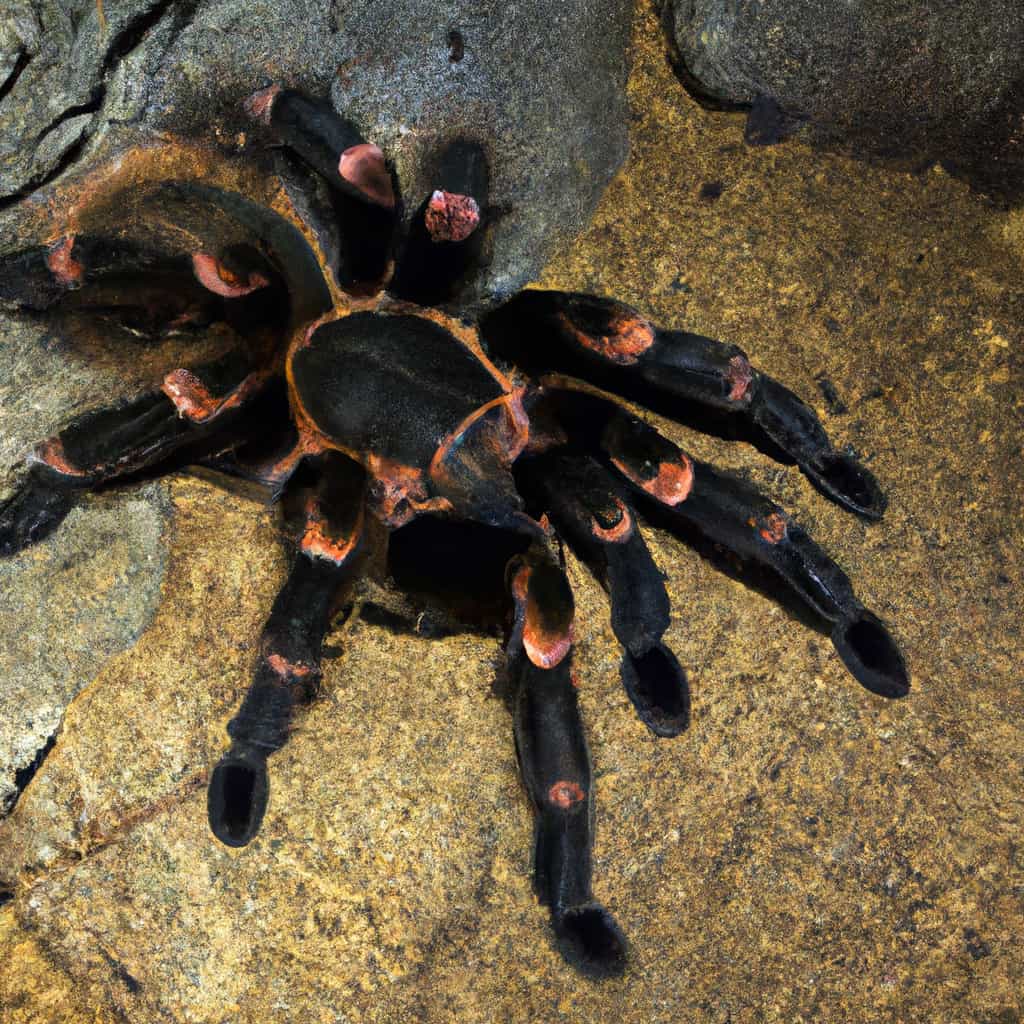Have you noticed that your tarantula is not eating? It can be concerning when your eight-legged friend isn’t interested in its food. However, it’s not uncommon for tarantulas to go through periods of fasting. In this article, I will discuss some of the common reasons why your tarantula may not be eating and what you can do to encourage it to eat.
Understanding tarantula’s eating habits is important to determine if your tarantula’s lack of appetite is something to be concerned about. Tarantulas are known to go through periods of fasting, especially during molting or when they are stressed. However, if your tarantula has not eaten for an extended period of time, it’s important to investigate further. There may be underlying health issues or environmental factors that are affecting your tarantula’s appetite.
Key Takeaways
- Tarantulas may go through periods of fasting, especially during molting or when they are stressed
- Investigate further if your tarantula has not eaten for an extended period of time
- Environmental factors and underlying health issues can affect your tarantula’s appetite

Understanding Tarantula’s Eating Habits
As a tarantula owner, it’s important to understand your pet’s eating habits to ensure they are healthy and happy. Tarantulas are known for their hearty appetite, but there are several factors that can cause them to stop eating. Here are some things to keep in mind:
- Frequency of feeding: Tarantulas are typically fed once or twice a week, but this can vary depending on the species and age of the tarantula. Younger tarantulas may need to be fed more frequently, while older tarantulas may only need to be fed once a week.
- Feeder type: Tarantulas can be fed a variety of feeders, including crickets, mealworms, and roaches. Some tarantulas may have a preference for certain feeder types, so it’s important to experiment to see what your tarantula likes.
- Feeder size: The size of the feeder should be appropriate for the size of the tarantula. Feeding a tarantula a feeder that is too large can cause digestive issues, while feeding a tarantula a feeder that is too small may not provide enough nutrition.
- Molting: Tarantulas will often stop eating in the weeks leading up to a molt. This is because they are preparing their bodies for the molting process and do not need to eat as much.
- Temperature: Tarantulas are more active and have a higher metabolism when it is warmer. When it gets cold, tarantulas become inactive and may not feed. It’s important to keep your tarantula’s enclosure at the appropriate temperature for their species.
- Stress: Tarantulas can become stressed for a variety of reasons, including changes in their environment, handling, or the presence of other animals. When a tarantula is stressed, they may stop eating.
By understanding your tarantula’s eating habits and monitoring their behavior, you can ensure that they are healthy and happy. If your tarantula stops eating for an extended period of time, it may be a sign of an underlying issue and you should consult with a veterinarian who specializes in exotic pets.
Common Reasons for Tarantula’s Loss of Appetite
As a tarantula owner, it can be concerning when your pet stops eating. While it’s normal for tarantulas to go on hunger strikes from time to time, there are some common reasons why your tarantula may be refusing food. Here are a few potential causes to consider:
Molting Process
One of the most common reasons why tarantulas stop eating is because they are preparing to molt or are currently in the molting process. During this time, tarantulas will often refuse food as their bodies focus on shedding their old exoskeleton and growing a new one. If your tarantula is exhibiting other signs of molting, such as becoming less active or hiding away in its enclosure, it’s likely that this is the reason for its loss of appetite.
Temperature and Humidity Issues
Tarantulas are sensitive to changes in temperature and humidity, and extreme fluctuations can cause them to stop eating. If your tarantula’s enclosure is too cold or too dry, it may not feel comfortable enough to eat. On the other hand, if the enclosure is too humid or too warm, it could lead to the growth of harmful bacteria or mold, which can also affect your tarantula’s appetite. Make sure that you’re maintaining the proper temperature and humidity levels for your tarantula’s species, and monitor these conditions regularly.
Stress Factors
Tarantulas can become stressed for a variety of reasons, and this can lead to a loss of appetite. Some common stress factors include:
- Overhandling
- Loud noises or vibrations
- Exposure to bright lights
- Enclosure overcrowding
- Poor diet or feeders that are too large
If you suspect that your tarantula is stressed, try to identify the source of the stress and remove it if possible. Additionally, make sure that your tarantula’s enclosure is spacious enough and that it has plenty of hiding places to help it feel secure.
By considering these common reasons for a tarantula’s loss of appetite, you can take steps to address the issue and help your pet get back to its healthy eating habits.
How to Encourage Your Tarantula to Eat
As a tarantula owner, it can be concerning when your pet isn’t eating. However, there are a few things you can do to encourage your tarantula to eat.
Offering Different Prey
Tarantulas can be picky eaters, so it’s important to experiment with different prey items to see what your tarantula prefers. Some tarantulas prefer live prey, while others prefer pre-killed prey. You can try offering crickets, mealworms, roaches, or even small mice.
It’s also important to make sure the prey is the appropriate size for your tarantula. Too large of prey can be intimidating and too small can be unsatisfying. Use a size chart to determine the appropriate size of prey for your tarantula.
Creating a Comfortable Environment
Tarantulas are sensitive creatures and can be easily stressed. It’s important to create a comfortable environment for your tarantula to encourage eating.
Make sure the enclosure is the appropriate size for your tarantula and has plenty of hiding spots. Provide a water dish and keep the enclosure clean.
Maintain the appropriate temperature and humidity levels for your tarantula’s species. If the temperature is too cold, your tarantula may not be as active and may not eat. If the humidity is too low, your tarantula may become dehydrated and lose its appetite.
When to Seek Professional Help
If your tarantula has not eaten for an extended period of time and you have tried all the possible solutions, it may be time to seek professional help. A veterinarian who specializes in exotic animals, including tarantulas, can help diagnose and treat any underlying health issues that may be causing your tarantula to stop eating.
Here are some signs that indicate it may be time to seek professional help:
- Your tarantula has not eaten for several months, and other solutions have not worked.
- Your tarantula appears lethargic, weak, or unresponsive.
- Your tarantula is losing weight rapidly.
- Your tarantula is exhibiting unusual behavior or symptoms, such as excessive webbing, twitching, or difficulty moving.
During your visit, be prepared to provide the veterinarian with information about your tarantula’s environment, feeding habits, and any other relevant details that may help with the diagnosis. The veterinarian may also ask to perform a physical exam or run tests to determine the cause of your tarantula’s lack of appetite.
Remember, it is always better to err on the side of caution when it comes to your pet’s health. Seeking professional help early on can prevent more serious health problems down the line.
Conclusion
In conclusion, there are several reasons why your tarantula may not be eating. It is important to identify the root cause of the problem in order to address it properly.
If your tarantula is already full, simply wait until it is hungry again before offering it food. If it is preparing to molt or molting, it is normal for it to stop eating. Just make sure to provide it with a humid environment to facilitate the molting process.
If you recently purchased or changed your tarantula’s tank, it may be adjusting to its new surroundings. Give it time to acclimate and try offering food every alternate week until it starts eating again.
Stress is another factor that may prevent a tarantula from eating. Make sure its enclosure conditions are optimal and avoid handling it too often.
Finally, some tarantulas may be picky eaters and ignore certain types of feeders. Experiment with different types of food to see what your tarantula prefers.
Remember, it is normal for some tarantulas to go without eating for months. However, if you notice any other concerning symptoms or behaviors, it may be best to consult with a veterinarian who specializes in exotic pets.
Frequently Asked Questions
How long can a tarantula go without eating?
Tarantulas can go for long periods without eating, especially during molting. Young juvenile tarantulas can go for a few weeks without food, while adult tarantulas can go for months. However, it is important to monitor your tarantula’s behavior and health during this time.
Why is my tarantula not eating after molting?
Tarantulas usually stop eating before, during, and after molting. This is because they need to conserve energy for the molting process. After molting, it may take some time for your tarantula to regain its appetite. Make sure to provide fresh water and wait patiently for your tarantula to start eating again.
Why is my tarantula not moving?
Tarantulas are generally slow-moving creatures, but if your tarantula is not moving at all, it may be a sign of stress or illness. Check the temperature and humidity levels in the enclosure, and make sure there are no signs of injury or illness. If you are concerned, consult a veterinarian.
Why is my tarantula’s abdomen shrinking?
A shrinking abdomen can be a sign of dehydration or malnutrition. Make sure your tarantula always has access to fresh water, and consider offering a variety of prey items to ensure a balanced diet. If the problem persists, consult a veterinarian.
Why is my Mexican red knee tarantula not eating?
Mexican red knee tarantulas are known to be picky eaters and may refuse certain types of food. Make sure you are offering a variety of prey items, and try offering food at different times of the day. If your tarantula continues to refuse food, consult a veterinarian.
Why hasn’t my tarantula eaten in a month?
It is not uncommon for tarantulas to go for extended periods without eating, especially during molting or in cooler temperatures. However, if your tarantula has not eaten for a month or more and is showing signs of weight loss or other health issues, consult a veterinarian.








